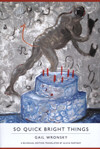So Quick Bright Things
If some of us want, and many of us do, to read translations in English of work written in other languages, it stands to reason that readers of other languages—Spanish, for example—might want to read poems written originally in English. Wronsky has translated Argentine poet Partnoy’s poetry into English. With So Quick Bright Things / Tan Pronto las Cosas, it’s Partnoy’s turn, beginning with a title (thank you Shakespeare) that’s brilliantly and awfully hard to translate. I applaud Partnoy for her smart, vivid translations of work that is exceptionally difficult to render in another language.
If some of us want, and many of us do, to read translations in English of work written in other languages, it stands to reason that readers of other languages—Spanish, for example—might want to read poems written originally in English. Wronsky has translated Argentine poet Partnoy’s poetry into English. With So Quick Bright Things / Tan Pronto las Cosas, it’s Partnoy’s turn, beginning with a title (thank you Shakespeare) that’s brilliantly and awfully hard to translate. I applaud Partnoy for her smart, vivid translations of work that is exceptionally difficult to render in another language.
Wronsky’s poems are fluid and “effusive” (there is a series of poems titled “Effusion 1,” etc.), yet also controlled, carefully sculpted. Here is the first “Effusion”:
Some of us
are so obsessed with the lyric past
that we die of it.
For some
it has the permanence of
bronze although it was conceived
in clay or plaster. Or by a
bird
flirting or murdering.
Every poem in the volume is similarly sculpted, drawn elegantly across the page making use of the physical space of the page to breathe a kind of lyrical eloquence into the effusive (but refined) energy of the lines. A “striptease” (“In Imitation of a Dream”), showy, but partially concealed.
The lyric past, the dream imitated, that obsesses Wronsky (and by extension her readers) is Shakespeare’s A Midnight Summer Night’s Dream. She modernizes the tale of Titania, Oberon, and Puck, ponders their “movie star” relevance, their “wireless telephone” presence; the “real place” they can have in a modern day fantasy, an erotic contemporary love story. These poems, like the play on which they are based, are dreamy and surreal, witty and other-worldly.
Despite their magical references and quality, these poems (or it this one long drama of a poem?) also ask us to consider some truly earthly concerns, none the least of which is the meaning of these poems themselves:
having noticed the way fragments dilute
the way the poem pulls to remove itself
from its subject.
Pulled both toward and away from its subject, this an ambitious project of a book, made more so by its bilingual incarnation. It has made me want to read, not as you might expect, Shakespeare, but the lyric past composed by Partnoy and Wronsky. This bright book has made me want to know what came before, how these poets found their way to this strange, quick, dreamy midnight of a book.





